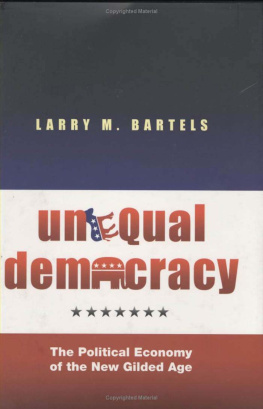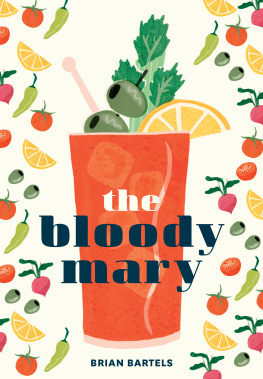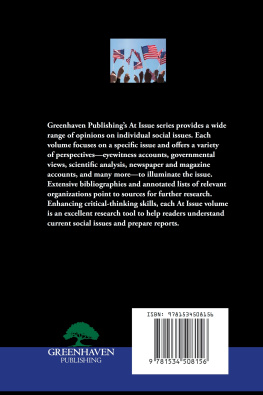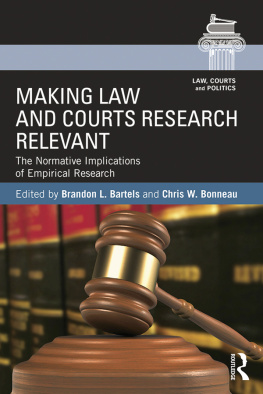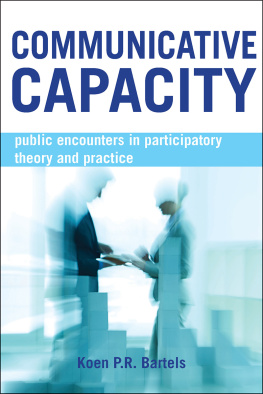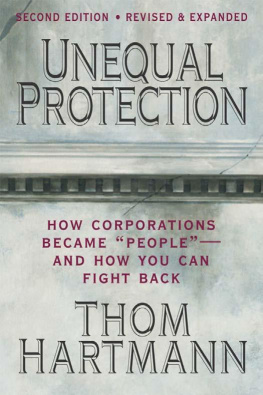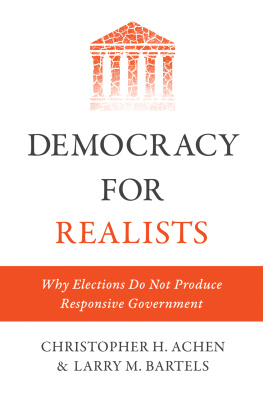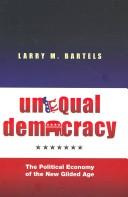Bartels - Unequal Democracy
Here you can read online Bartels - Unequal Democracy full text of the book (entire story) in english for free. Download pdf and epub, get meaning, cover and reviews about this ebook. publisher: Princeton University Press, genre: Politics. Description of the work, (preface) as well as reviews are available. Best literature library LitArk.com created for fans of good reading and offers a wide selection of genres:
Romance novel
Science fiction
Adventure
Detective
Science
History
Home and family
Prose
Art
Politics
Computer
Non-fiction
Religion
Business
Children
Humor
Choose a favorite category and find really read worthwhile books. Enjoy immersion in the world of imagination, feel the emotions of the characters or learn something new for yourself, make an fascinating discovery.
Unequal Democracy: summary, description and annotation
We offer to read an annotation, description, summary or preface (depends on what the author of the book "Unequal Democracy" wrote himself). If you haven't found the necessary information about the book — write in the comments, we will try to find it.
Bartels: author's other books
Who wrote Unequal Democracy? Find out the surname, the name of the author of the book and a list of all author's works by series.
Unequal Democracy — read online for free the complete book (whole text) full work
Below is the text of the book, divided by pages. System saving the place of the last page read, allows you to conveniently read the book "Unequal Democracy" online for free, without having to search again every time where you left off. Put a bookmark, and you can go to the page where you finished reading at any time.
Font size:
Interval:
Bookmark:

UNEQUAL DEMOCRACY
UNEQUAL DEMOCRACY
THE POLITICAL ECONOMY OF
THE NEW GILDED AGE
Larry M. Bartels
RUSSELL SAGE FOUNDATION NEW YORK
PRINCETON UNIVERSITY PRESS PRINCETON AND OXFORD
Copyright 2008 by Russell Sage Foundation
Requests for permission to reproduce material from this work should be sent to Permissions,
Princeton University Press
Published by Princeton University Press, 41 William Street, Princeton,
New Jersey 08540
In the United Kingdom: Princeton University Press, 6 Oxford Street, Woodstock,
Oxfordshire OX20 1TW
Russell Sage Foundation, 112 East 64th Street, New York, New York 10021
All Rights Reserved
ISBN: 978-1-40082-835-7
Library of Congress Cataloging-in-Publication Data
Bartels, Larry M., 1956
Unequal democracy : the political economy of the new gilded age / Larry M. Bartels.
p.cm.
Includes bibliographical references and index.
1. United StatesEconomic conditions1945 2. EqualityEconomic aspectsUnited States. 3. political cultureUnited StatesHistory. 4. Social classesPolitical aspects United States. 5. Power (Social sciences)Economic aspectsUnited States. 6. DemocracyEconomic aspectsUnited States. I. Title.
HC106.5.B347 2008
330.973dc222007044382
British Library Cataloging-in-Publication Data is available
This book has been composed in New Caledonia
Printed on acid-free paper.
press.princeton.edu
Printed in the United States of America
1 3 5 7 9 10 8 6 4 2
For my brother, Thomas Raymond Bartels,
who lived poor and died young


This book reports the results of a six-year exploration of the political causes and consequences of economic inequality in America. It is inspired, in significant part, by a major change in American society over the past three decadesthe substantial escalation of economic inequality that I refer to as the New Gilded Age. That economic transformation has attracted considerable attention from economists but much less attention from political scientists. It seemed to me, as a student of American politics, that careful attention to public opinion, partisan politics, and public policy might shed valuable new light on how and why the economic fortunes of affluent, middle-class, and poor people have diverged so dramatically in the contemporary United States.
As a student of democracy, it also seemed important to me to explore the ramifications of escalating economic inequality for the American political system. Probably most sentient observers of American politics suspect that the concentration of vast additional wealth in the hands of affluent people has augmented their influence in the political arena, while the stagnating economic fortunes of middle-class and poor people have diminished their influence. However, systematic measurement of political influence is at a very rudimentary stage, leaving political scientists remarkably ill-equipped to confirm, refute, or qualify that suspicion. I have attempted here, through a combination of systematic statistical analysis and case studies, to assess the extent to which economic inequality in contemporary America gets translated into political inequality.
Some readers are likely to see the product of my efforts as a rather partisan book, at least by academic standards. For what it is worth, I can report that it did not start out that way. I began the project as an unusually apolitical political scientist. (The last time I voted was in 1984, and that was for Ronald Reagan.) While I was prepared to find that parties and partisanship play an important role in the politics of economic inequality, as they do in many domains of American politics, I was quite surprised to discover how often and how profoundly partisan differences in ideologies and values have shaped key policy decisions and economic outcomes. I have done my best to follow my evidence where it led me.
In telling this story I have attempted to balance the demands of scholarship and accessibility. My aim has been to make the text and figures comprehensible to general readersat least to general readers who have some patience for the twists and turns of serious arguments and systematic evidence. Tables and notes provide additional scholarly detail, some of which will only be intelligible or interesting to people with some background in social science or statistics or both. I recognize that any compromise of this sort is bound to leave readers in both camps less than fully satisfied; however, I view it as a necessary accommodation to the prevalence of social-scientific illiteracy among Americans who read (and write) about politics and public affairs.
I suspect that the prevalence of social-scientific illiteracy in American public discourse is both a cause and an effect of the fact that social-scientific research is woefully undersupported in American society. However, I have been unusually fortunate in finding generous financial, institutional, and personal support for my work, and it is a great pleasure to acknowledge that support here.
Princeton University and its Woodrow Wilson School have provided time and facilities for research, as well as regular access to stimulating students and colleagues. I am grateful to the past and present deans of the Woodrow Wilson School, Michael Rothschild and Anne-Marie Slaughter, for building and maintaining a vibrant intellectual community in which to pursue serious analysis of significant public issues. I am also grateful to students in my Wilson School seminar on Inequality and American Democracy for serving as an invaluable test-audience for the first complete draft of the book, and to my colleagues Roland Bnabou, Angus Deaton, Alan Krueger, Jonathan Parker, and Mark Watson for providing generous advice about economic issues and literature.
Within the Woodrow Wilson School, my primary home for the past eight years has been the Center for the Study of Democratic Politics. The faculty, visitors, students, and staff there have provided abundant intellectual and moral support, including appropriate mixtures of criticism and encouragement in response to half-baked arguments presented in lunch seminars, conferences, and common room chats. I am especially grateful to Doug Arnold, Brandice Canes-Wrone, Michele Epstein, Marty Gilens, Dave Lewis, Nolan McCarty, and Markus Prior for helpful reactions and suggestions. As I have come to expect over the years, Chris Achen provided especially cogent advice and especially generous encouragement. He also graciously tolerated the constraints imposed by this project on the progress of our long-running collaborative work on democratic accountability. Next!
I have also benefited greatly, and repeatedly, from the generous support of the Russell Sage Foundation and its president, Eric Wanner. The first stages of my research were conducted as part of the Princeton Working Group on Inequality, one of several interdisciplinary research teams supported by the Russell Sage Foundation through its Social Dimensions of Inequality project. I thank Bruce Western, the ringleader of the Princeton Working Group, for involving me in the project, and Bruce, Paul DiMaggio, Leslie McCall, Nolan McCarty, and Howard Rosenthal for providing a supportive collaborative setting in which to tackle issues well outside the range of my previous scholarly expertise. Annual meetings of the various Russell Sage Foundation working groups at Harvard (2001), Wisconsin (2002), Maryland (2003), Princeton (2004), Berkeley (2005), and UCLA (2007) served as a floating boot camp introducing me to many of the toughest issues and much of the best current research in the field.
Font size:
Interval:
Bookmark:
Similar books «Unequal Democracy»
Look at similar books to Unequal Democracy. We have selected literature similar in name and meaning in the hope of providing readers with more options to find new, interesting, not yet read works.
Discussion, reviews of the book Unequal Democracy and just readers' own opinions. Leave your comments, write what you think about the work, its meaning or the main characters. Specify what exactly you liked and what you didn't like, and why you think so.

